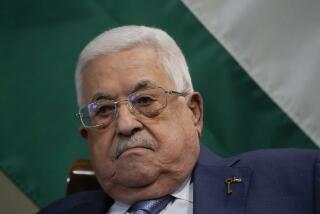A Rocky 4 Months in Office
- Share via
JERUSALEM — After four months in office, Mahmoud Abbas ended his tenure as Palestinian Authority prime minister Saturday exactly the way he began it -- mired in a power struggle with Yasser Arafat.
Before he was even sworn in in late April, Abbas already was at odds with the Palestinian Authority president over how much power he would wield, particularly over their security forces. Abbas, who was named to his post by Arafat under intense international pressure, refused to take the job unless he could install an ally as security minister over Arafat’s objections.
The 68-year-old Abbas won that battle through a last-minute compromise. But after he took office, he was never able to wrest enough power or popularity away from Arafat to push through even a modest agenda, or to advance a U.S.-backed peace plan known as the “road map.”
The bickering between the two men came to overshadow Abbas’ entire premiership, from his efforts at reforming the internal workings of the Palestinian Authority to his attempts to rein in militant groups, analysts said.
Arafat was determined to remain both the symbol and substance of the Palestinian struggle for statehood.
“What went wrong from the start was the misconception that an appointed Palestinian prime minister would have any more effective authority than any other appointed prime minister” in the Arab world, said Mark Heller, an Israeli political analyst. “For some reason, there was some expectation that he would be the exception. But the rule is that every other Arab appointed prime minister ... is usually a nonentity and is usually disposable.”
Still, many foreign governments, including the Bush administration, hailed Abbas’ appointment and praised him as a moderate who understood the need to stop the 35-month-old Palestinian uprising and implement the peace plan, which envisioned a Palestinian state in three years.
In a speech setting out his goals as prime minister, Abbas promised to strengthen Palestinian democracy and demanded that militias lay down their arms.
“I repeat, there is no military solution to our conflict,” he said.
Abbas installed his own security chief, Mohammed Dahlan, but his ability to crack down on militant groups was compromised from the outset because Arafat kept his hands on the reins of most of the Palestinian Authority security forces.
As a low-key diplomat who served as a negotiator during the Oslo peace process, Abbas, who also is known as Abu Mazen, had little standing with militant organizations such as Hamas, or on Palestinian streets, where many people still looked to Arafat as the embodiment of Palestinian resistance.
To many, Abbas was a gray suit, a bland leader who shied away from confrontation but was given to occasional fits of pique, including issuing periodic resignation threats.
Abbas’ supporters in Israel and the U.S. became a liability for him. What looked to much of the world like a moment of triumph -- the June 4 summit in Aqaba, Jordan -- when Abbas smiled for the cameras with President Bush and Israeli Prime Minister Ariel Sharon, was regarded by many Palestinians as proof that he was nothing more than a toady.
Continued declarations of support from Washington only fueled suspicion among Palestinians that their premier was an American puppet.
“All this talk implying that anyone who expresses no confidence in Abu Mazen is also expressing no confidence in George Bush [is] only further weakening Abu Mazen,” Ahmed Tibi, an Arab member of the Israeli parliament, said in a radio interview Friday.
After the Aqaba summit, Hamas accused Abbas of giving away too much and cut off talks with him.
When Hamas and another radical group, Islamic Jihad, announced a three-month cease-fire June 29, it was largely the product of Egyptian intervention and with the tacit approval of Arafat, even though Abbas trumpeted it as a victory of his government.
While Palestinians and Israelis alike welcomed the truce, there was little improvement on the ground for many in the West Bank. Israeli tanks still rumbled through towns and villages and soldiers rounded up suspected militants and imposed curfews.
Palestinian disenchantment with Abbas grew, and so did criticism from Israel, which accused him of failing to go after the militias, a move Abbas warned would spark a Palestinian civil war. For his part, Abbas accused Israel of making few concessions or offering hollow gestures such as a prisoner release that included dozens of people on the verge of finishing their sentences anyway.
Last month, the cease-fire that Abbas had pointed to as a major achievement collapsed with suicide bombings, including a devastating attack on a Jerusalem bus.
In the aftermath, Abbas demanded to be put in full charge of the entire Palestinian Authority security apparatus. Arafat refused, instead appointing a new personal advisor on security issues in a move widely seen as further undercutting Abbas.
By the time the Palestinian Legislative Council gathered Thursday to hear Abbas review his first 100 days in office, the mood in the leadership was tense. Outside, the scene was even uglier. Masked men from the armed wing of Arafat’s Fatah faction pounded on the door with clubs in protest against Abbas, who had looked frightened as guards hustled him through a mocking crowd.
One associate said that was the last straw for Abbas, who knew that such a protest must have had Arafat’s consent.
“We have to say that what happened in the Legislative Council two days ago has greatly affected brother Abu Mazen and insulted him on the emotional, personal and even political level,” Nabil Amr, the Palestinian Authority information minister, told Al Jazeera satellite television Saturday morning.
Two hours later, Abbas handed in his resignation.
More to Read
Sign up for Essential California
The most important California stories and recommendations in your inbox every morning.
You may occasionally receive promotional content from the Los Angeles Times.











